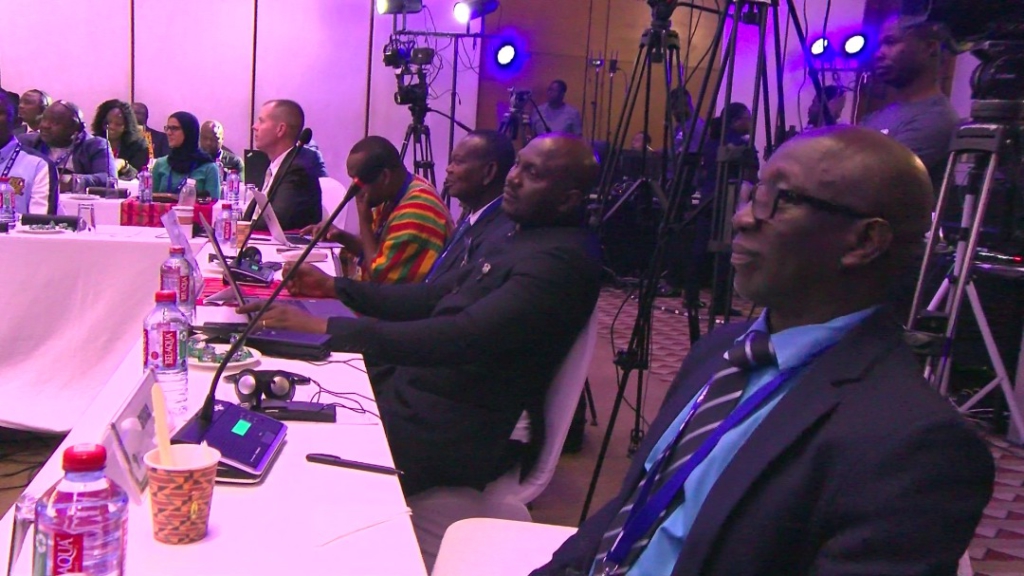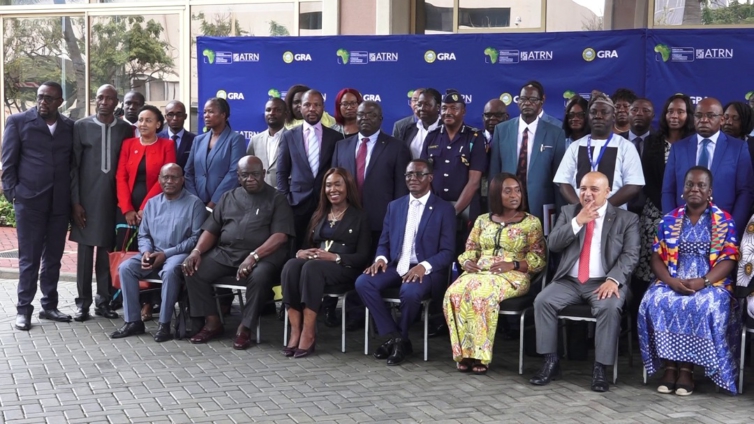The African Tax Research Network and African Tax Administration Forum have agreed to press on governments on the continent to rationalise tax incentives regimes in Africa.
The move is aimed at helping members on the continent to raise more domestic revenue to make up for some projected losses due to the African Continental Free Trade Agreement.
Executive Secretary of the Forum, Logan Wort has been explaining to journalists after a short ceremony to close a three-day congress in Accra.

The forum focused on the revenue implications of the continental free trade agreement.
“There will be the need for review and rationalisation of the various tax incentives to multinationals because in Africa, the taxes will be needed more.
Tax incentives send away huge portions of income, the continental losses in tax incentives are more than 3 percent of the continents GDP yet we are not doing any cost benefit analysis on these incentives.
The proposed global agreement on the taxation of the digital economy is to introduce a global minimum tax which has implications on Africa” Mr. Wort told Joy Business.
Commissioner General of the Ghana Revenue Authority who is also the conference host, Rev. Dr. Amishaddai Owusu Amoah called on government representatives to ensure that the ideas and agreements made at the congress are being implemented to the latter.
He believes, that will be the surest way to improve revenue for the continent and have the full benefits of the continental free trade agreement.
About the forum
Thirty-two African countries , were represented by over 230 participants from Ministries of Finance, African Tax Administrations, the African Union Commission, the AfCFTA Secretariat, Members of Parliament, Civil Society, Academia, UN, OECD, IMF, WCO,WBG, Development Partners, Captains of Industry, media practitioners and other key partners and individual tax policy experts.
The participants stressed the importance of countries to maximize gains from the AfCFTA, and welcomed the opportunity presented by the ATRN to deliberate further on how a possible drop in revenue due to tariff liberalization can be mitigated, and the increase in intra-Africa trade harnessed to increase not only Countries tax bases, but improved economic development.
The purpose of the congress was to deliberate on the tax and revenue implications of the African Continental Free Trade Agreement. In particular, participants discussed the short-, medium- and long-term implications of the AfCFTA, steps member states may take to adjust policies to counter effects of estimated short term revenue losses, and the broader tax policies issues raised by the AfCFTA.
Here is a Summary Of Dialogues Agreed Upon At The End Of The Three Days Session In Accra
The meeting observed that based on data from 35 African tax Outlook members, import duties contributed to 6.41% of total tax revenue in 2020. Out of the five main tax types, import duties were on bottom position, while the top 3 were VAT, Personal Income Tax and Corporate Income.
Imports from Africa are very low compared to those from the rest of the world, averaging 13% between 1995 & 2020. Therefore, although there are expected tariff revenue losses in the short term, this will be marginal.

Regarding the long-term effects of the AfCFTA, the meeting agreed that the AfCFTA would increase overall income and welfare for most African countries. The long-term benefits of the AfCFTA, including lowering trade costs, promoting regional value chains and providing consumers with greater variety, may balance out the short-term losses. It is expected that growth in GDP and consumption will positively impact on the performance of domestic taxes.
Participants agreed that the opportunities for trade and investment require capacity building at both the technical and infrastructural level. There also needs to be greater cooperation at the regional level for the successful implementation of trade facilitation measures.
At the national level, short term losses could be minimised through various measures including, a rationalization of tax incentive regimes, improving efficiencies within tax administration through the use of technology, intensifying the fight against illicit financial flows, and broadening the tax base.
The meeting recognized that whilst the frameworks for multilateral trade, international investment agreements (IIAs) and international taxation have developed in parallel, governed by different rules and principles, they continue to overlap.
The growing trend of tax-related Investor State Dispute Settlement (ISDS) under the IIA framework should be a concern for tax authorities everywhere.
If cooperation and integration are the real desire, it is time to discuss a shared approach on the use of tax incentives, at the very least in order to protect or support the lesser developed nations in the community.
A shared approach towards the combatting of IFFs will be crucial to protecting the financial integrity of the future customs union and single market.
State Parties, the African Union and the AfCFTA Secretariat should take immediate action on this matter by introducing the combatting of IFFs as a general objective of the Agreement and prepare a strategy for rapid harmonization, regional inter-agency cooperation and identification of capacity or framework strengthening needs.
Regional Economic Communities are the building blocks of the African Economic Community and have an important role to play in the implementation of the AfCFTA and trade facilitation programmes. We need to strengthen inter-agency collaboration, ensure the inclusion of soft issues in all trade and transport projects (e.g ICT), consultation with all stakeholders, harmonization of policies, strengthen trade governance and relevant institution, develop regional value chains to ensure no country feels left behind in the integration process and institutionalize public private dialogue on regional integration issues.
Latest Stories
-
Let’s prioritize research quality in higher education institutions for industrial growth-Prof. Nathaniel Boso
4 hours -
Herman Suede is set to release ‘How Dare You’ on April 24
8 hours -
Heal KATH: Kuapa Kokoo, Association of Garages donate 120k to support project
8 hours -
KNUST signs MOU with Valco Trust Fund, Bekwai Municipal Hospital to build student hostel
8 hours -
The influence Ronaldo has on people, Cadman Yamoah will have same on the next generation – Coach Goodwin
9 hours -
Gender Advocate Emelia Naa Ayeley Aryee Wins prestigious Merck Foundation Awards
10 hours -
South Africa bursary scandal suspects granted bail
10 hours -
Ecobank successfully repays $500m Eurobond due April 18
10 hours -
Re: Doe Adjaho, Torgbui Samlafo IV, call for Unity among Paramountcies in Anlo
10 hours -
Extortion and kidnap – a deadly journey across Mexico into the US
10 hours -
Rihanna says fashion has helped her personal ‘rediscovery’ after having children
11 hours -
Development Bank Ghana targets GH¢1bn funding for commercial banks in 2024
11 hours -
Shatta Movement apologises to Ghana Society of the Physically Disabled after backlash
12 hours -
Sammy Gyamfi writes: Tema-Mpakadan Railway Project; A railway line to nowhere
12 hours -
Bright Simons: Is the World Bank saving or harming Ghana?
12 hours

